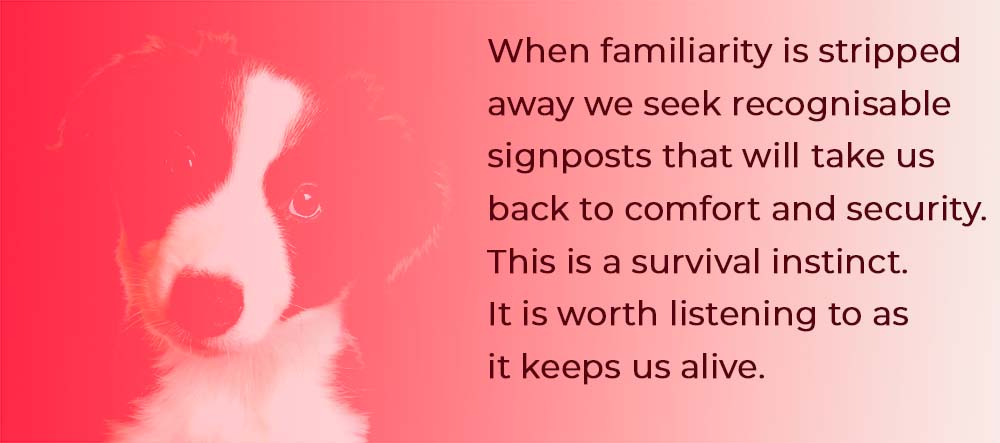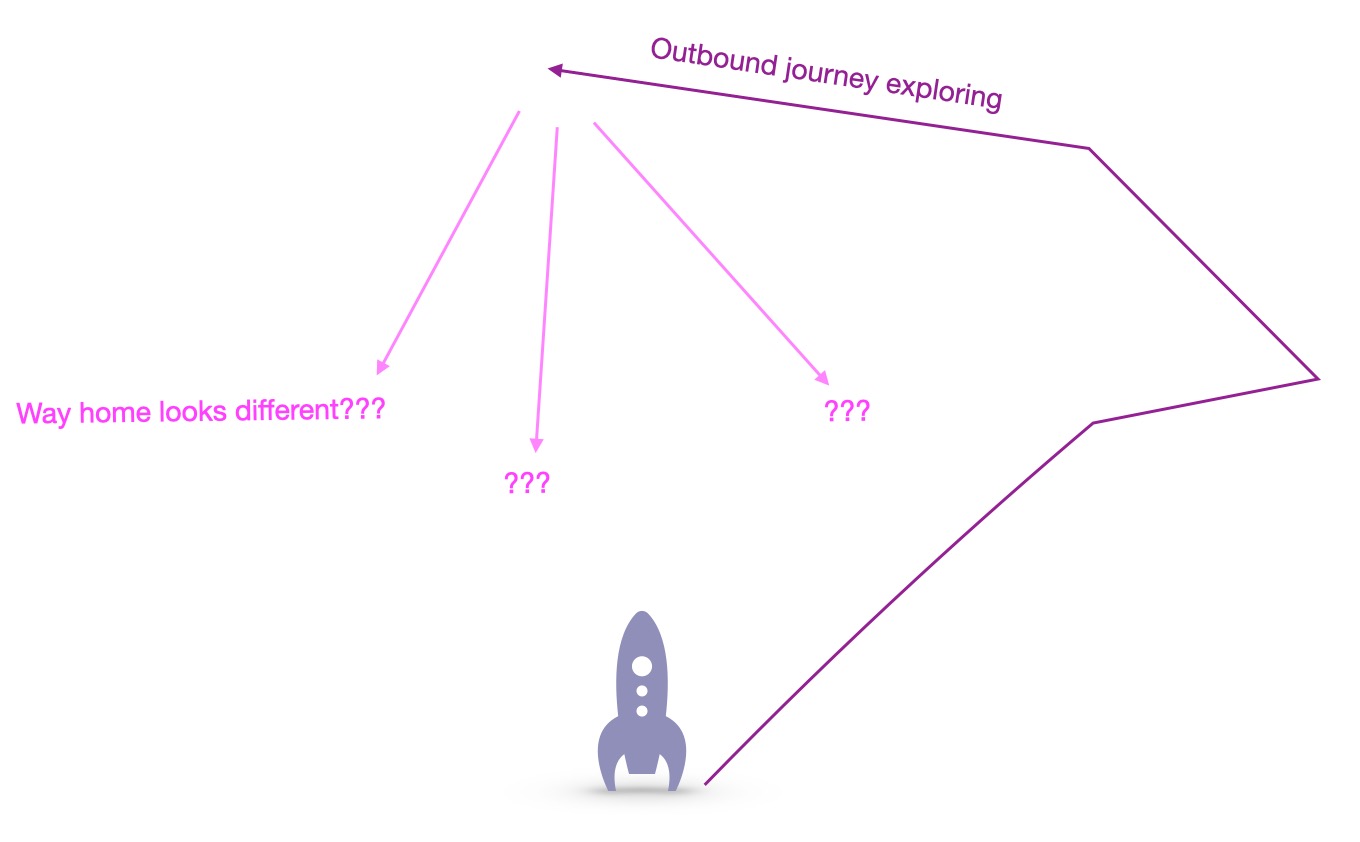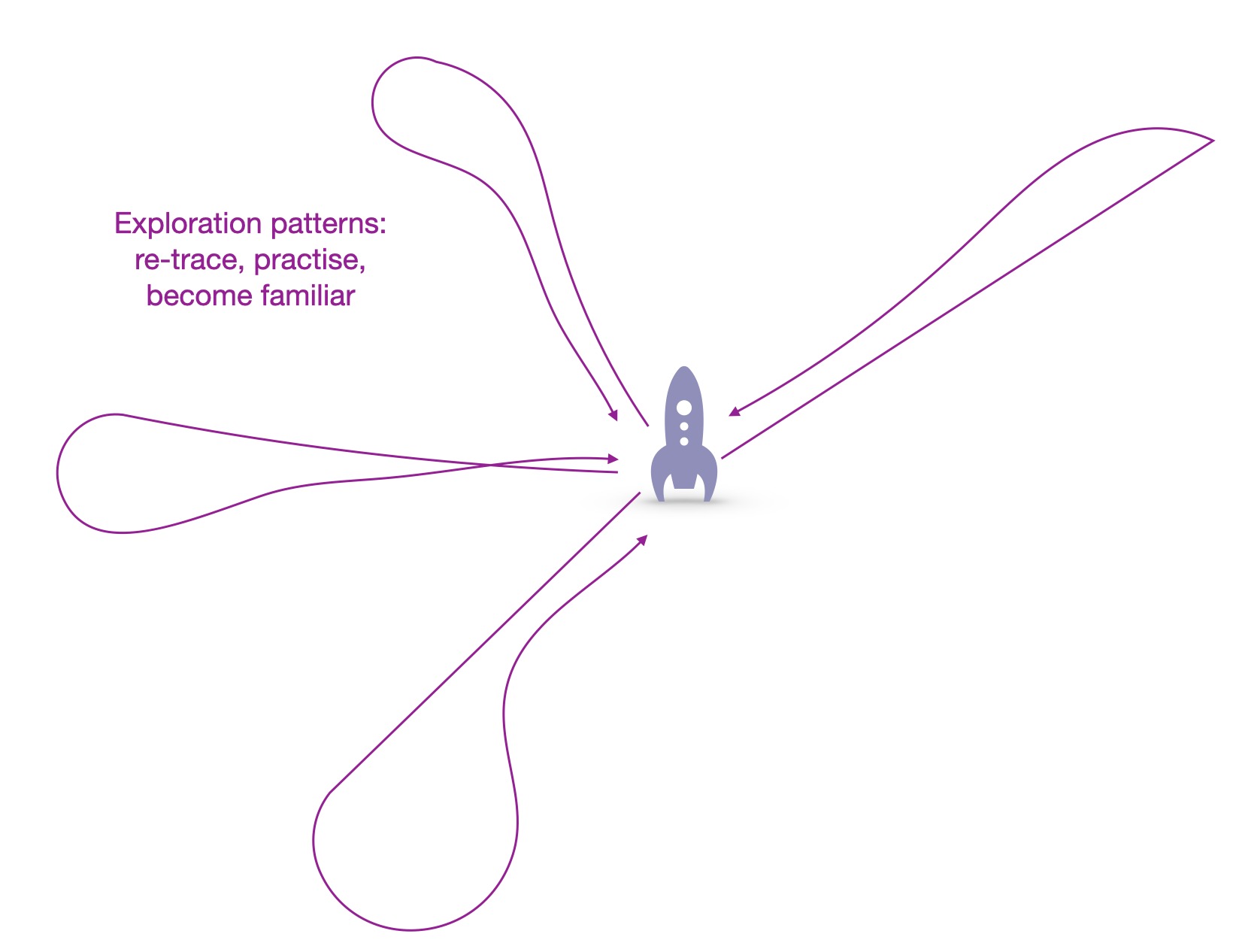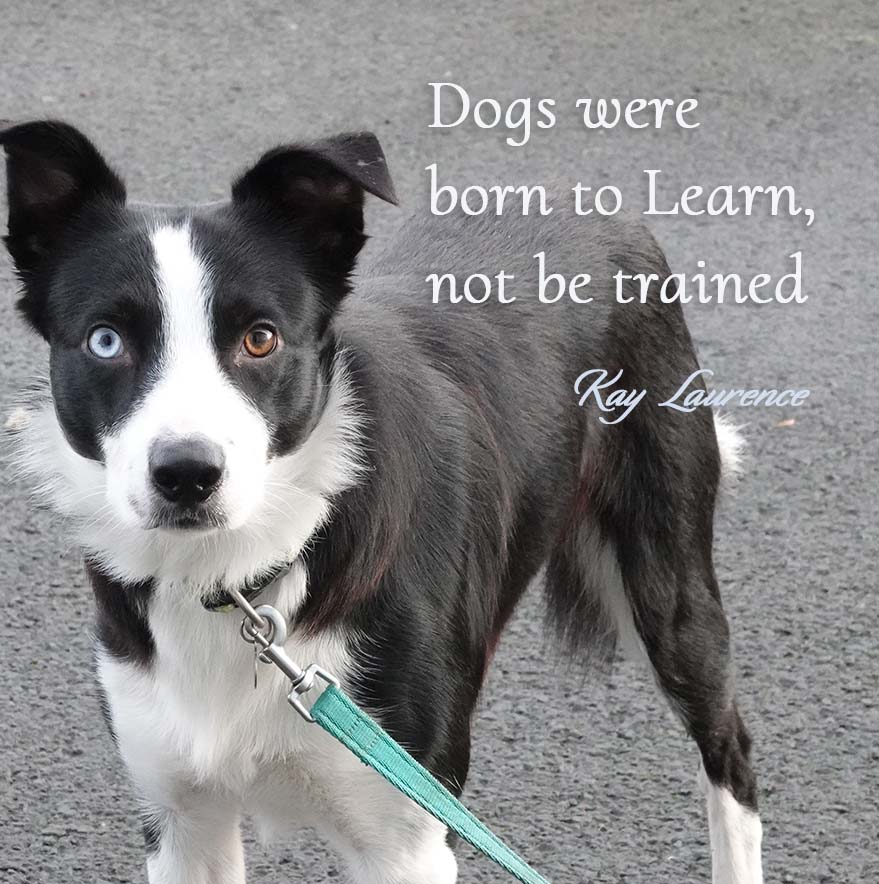A Road to Nowhere

Late Winter afternoon in losing light and the backdrop of dismal rain. Blast it! Just missed that turning. Never mind I’ll take the next likely looking option. Ten minutes later that option deteriorates to a fading hope. No space to turn around and the road is becoming a track. A feeling of unease and annoyance is building: I do not want to reverse the last 2 miles or have to turn around in a private drive.
This is not even my car, finding the lights was bad enough now I can’t control the heating. Blast, blast and blast.
This sounds like the opening of a murder story: a stranger suddenly appeared from behind the hedge carrying an axe.
No story, just our version of a day out for a young dog.

When familiarity is stripped away we seek recognisable will take us back to comfort and security. This is survival instinct. It is worth listening to as it keeps us alive.
Familiar is represented by:
- A place we feel safe
- A place where we know how to return to safety even when we are on adventures.
- Help and support when we ask for it.
I have been driving to strange places around the country for 50 years, a field here, and warehouse there. Of course I have; I was a sport dog enthusiast who needed to attend as often as possible to be able to “have that chance”, and I liked the company.
I know from experience you don’t “just try” the next likely looking option, you turn around and GO BACK. A naïve driver may have adventurous confidence when all other elements are familiar: good weather, own reliable car, phone and a companion. But when those layers are stripped away and the road becomes unfamiliar our need to concentrate increases, we go slower. We need our companion to STOP TALKING. As the rain gets heavier and the road harder to see our anxiety will increase. Driving when becoming more frightened is going to reduce our skills, competence and confidence. Home seems eminently desirable.
This is not something we would wish on any driver; we can learn from these situations and be more prepared, look for alternate safe options and know we can opt to return home at any time we feel uncomfortable. Driving while anxious is not to be recommended, either a lone country lanes or aggressive rush hour traffic. A new car needs best conditions to be learned until it becomes familiar and we can find the switch for the lights without conscious thinking.
Familiarity is a foundation of comfort and security from which we have the confidence to try new things, explore the unknown because we know that we can find our comfort and security with ease.
For a pup this is their home environment where they learn to recognise their safe places to sleep, be warm, the door to the garden, where the toys are kept, the routines of the people around them. They have company when needed, hunger is anticipated and they can play and learn in safety because the adults are taking care.
But what happens for the pup that is carried to a new place and dunked onto the floor? Where is home, where to run to when they become frightened? Whose legs to climb to find familiar scent and sounds?
The long term effect is a loss of confidence of new places, or anywhere unfamiliar. If their anchor-person is inattentive or leaves them with strangers the sense of abandonment hits fast. Not a thing is familiar, no signposts, no route home. Carrying pups to new places should never result in unfamiliar.
What does familiarity look like?
We know what it feels like to us but when we are taking our new youngster out on unknown adventures we must be able to recognise their evaporating confidence. It may begin with moving slower, more hesitantly, along an unknown path and even coming to a stop. Moving closer to you, avoiding strangers either canine or human. Constantly scanning the environment seeking the way home.
Imagine you have landed on a strange, new planet. If you are leading the expedition party you will make sure NOT lose sight of the spaceship: the only safe place and way home. Exploring will involve as many return journeys to the ship as outbound journeys. A route home to safety needs to become familiar, practised and achievable with speed. We seek recognisable landmarks, and for the pup, scents.


There will be the gung-ho adventurer who wants to see around the next corner but we all know they are the first to be taken out by the aliens.
Survival is an instinct that we should never ignore or dismiss. Your dog is developing their skills of survival and needs to learn when they smell “alien” it is time to seek safety and with haste. This takes practice and lots of familiarity. Where are the adults?
Nurture Survival Instincts and Build Confidence
Consider all the elements that your youngster will be using to feel safe:
Proximity to you or familiar people or dogs. This may be within distance to hear or scent where you are even if out of sight.
Knowledge of their environment: where to go, where to eat, where to sleep. A series of recognisable routes, a mental map of safe locations. Rehearsing these routes is important so that safety can be found even when bolting from dangers.
Routines and patterns of their surrounding group: including family and dogs, delivery drivers and visitors. What happens when and in which order. Learning what is their normal and recognising states of alert, resting, play, preparation of food.
Conversations with adults, you. When they feel a need for comfort it is recognised and supplied, a need for the garden it is offered, hunger is anticipated and alleviated.
Each of these will be associated with positive experiences and make the foundation for introducing new elements on a gradual basis. Some of these elements may not be positive: the loud barking of the group when delivery driver arrives, thunder, intrusive treatment or handling. But with a good foundation of security these events can be learned, avoided or recovery achieved with ease.
Adventures and more positive experiences can be added to build a Library of Familiar. This library needs sufficient time for assessment and evaluate and plenty of sleeping in between to add the new memories to the hard drive. Too much in one go can easily overwhelm and be forgotten.
Multiple places of safety
The pup will have fixed places of safety: such as their bed, the home, the sofa and they will also need travelling places of safety: the car, by your side and their family or other dogs.
For dogs with abandonment histories the more associations of safety the more likely an absence of one source is less likely to have an impact. When they feel safe at home, with the rest of the family, either people or dogs, then your leaving is not going to have the extreme impact.
They may feel safe left in the car provided they can see you at all times.
Introduction of new events or people or noises can be introduced when the pup is surrounded in an environment of safety. But if the environment is most unknown with just a small element of safety present, you, then these introductions can easily be more overwhelming.
The pup will need consistency alongside a travelling safety adult.

Familiar is different
Even though we think we are taking the pup to a place they have previously visited it may appear quite different and unfamiliar at a different time of day, in different weather conditions or seasons. You may be wearing a different unfamiliar outfit and there may be a whole cascade of new scents in the environment.
The picture will not look the same. Remembering a place, events or situation is a skill that develops over time and one that we are encouraging the dog to learn. As they get better their confidence in a revisit will return sooner.
We are often seeking to develop a youngster who as an adult will be able to travel with comfort, sleep over in new places and be around unknown dogs and people. We may even ask this dog to perform or work in new, unfamiliar conditions.
Returning to places already visited is important to develop the skills of recognition and develop confidence. We can also use those repeat visit to evaluate this developing skill through monitoring their levels of confidence.
The pup decides familiar
It does not matter that we have become familiar with a weird situation only the pup or even adult can make that decision. If they feel uncomfortable then that is entirely valid. Building the library of new experiences should be graduated alongside your evaluation process;
For any new event, situation or activity we want to gauge the dog’s level of comfort:
1. Stillness and connection:
Have they had time when at our side in stillness to scan the environment, smell the air? This may be the moment of arrival, as we step into a new space or leave a familiar space: jump out of the car.
Are they stimulated by the novel scents: visually scanning with a forward balance, sniffing air in many directions?
Are the suspicious by novel situations? Reluctant to step out of a familiar space, body weight held backwards?
With either of these response it is absolutely NOT the moment to let the dog off lead to explore or lose their connection to us. Connection is built with their awareness of our movement. If we shift our balance are they able to respond?
If not, then the environment is demanding too much of their attention and assessment skills. This is not the time to be moving about or asking for responses.
Stillness is still learning.
2. Responding to simple, well known cues:
Once we see that connection begin with activities from our foundation repertoire. Look at their speed of response: is this as good as when in familiar, secure environments? Is their response good but the behaviour slightly slower, or more anxious or distracted? Can they focus on us and give their happy best?
3. Rebuild the learning:
Go through many of the steps through which they learned the more complex behaviours. This builds confidence through the familiarity of actions. Actions and responses they have performed many times for Most Excellent Rewards.
Are they able to show the same pleasure in these rewards? Look for signs of their joy when the reward predicting stimulus (marker) is delivered.
Complete absorption in the reward process
is an prime indicator of feeling
secure and safe.
Constantly look for signs of unease: running through familiar activities will often contribute to giving the dog the comfort and security that is not offered from the environment or stuffing food at them. It is also going to make us feel a lot better: this is a partnership.
At any time a new event may take away their comfort and security and fatigue will also have an impact.
From going to early competitions, classes or attending regular events we build a confident dog able to find familiarity in the way we behave, what we do and routines that tell them all is well. But asking a green dog to learn too many new places too soon can destroy this confidence and survival responses will be their first options: get out of here, find home, protect from novel, defend personal space.
It is never about counting experiences, but building experiences that are without stress, comfortable, interesting and having time to learn what makes them familiar. Better to have been to six new places that are now returned to with enthusiasm and desire to play, rather than 36 new types of flooring, 18 new people, 7 trains, 83 streets walked that are rushed and pass by in a blur of uncertainty and leave a desire to avoid.
Overwhelming without familiarity leads to overcharged survival responses.
Our aim is to build pleasant learning experiences in new environments. Unhurried, learning together.











0 Comments